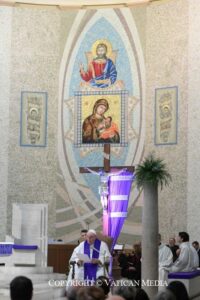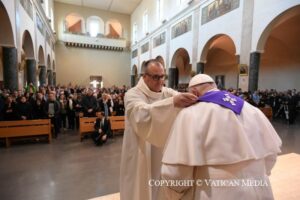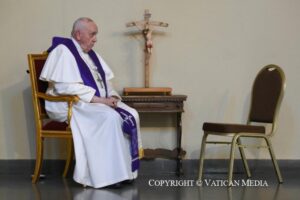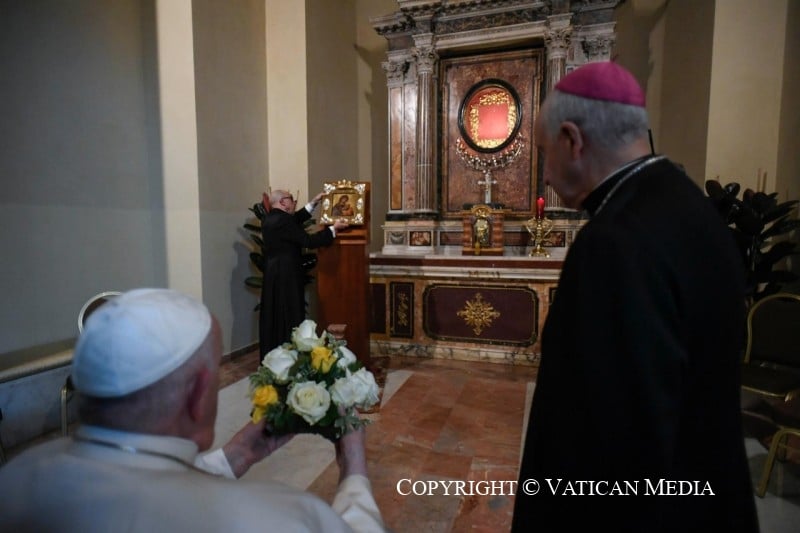This afternoon, in the parish of Santa Maria delle Grazie al Trionfale, the Holy Father Francis presided over a Penitential Liturgy for the Reconciliation of several penitents with the confession and individual absolution.
The celebration opened the Lenten initiative “24 hours for the Lord”, promoted by the Dicastery for Evangelisation. Also this year the event will be celebrated in dioceses around the world, on 17 and 18 March 2023, on the eve of the Fourth Sunday of Lent, Sunday “in Laetare”.
We publish below the homily that the Pope delivered during the Celebration Penitential:
Homily of the Holy Father

People who are extremely rich in their own minds, and proud of their religious accomplishments, consider themselves better than others – how frequently does this happen in a parish: “I’m from Catholic Action; I’m going to help the priest; I do the collection… it’s all about me, me, me”; how often people believe themselves better than others; each of us, in our hearts, should reflect on whether this has ever happened – they feel satisfied that they cut a good figure. They feel comfortable, but they have no room for God because they feel no need for him. And many times “good Catholics”, those who feel upright because they go the parish, go to Mass on Sunday and boast of being righteous, say: “No, I don’t need anything, the Lord has saved me”. What has happened? They have replaced God with their own ego, and although they recite prayers and perform works of piety, they never really engage in dialogue with the Lord. They perform monologues in place of dialogue and prayer. Scripture tells us that only “the prayer of the humble pierces the clouds” (Sir 35:1), because only those who are poor in spirit, and conscious of their need of salvation and forgiveness, come into the presence of God; they come before him without vaunting their merits, without pretense or presumption. Because they possess nothing, they find everything, because they find the Lord.
Jesus offers us this teaching in the parable that we have just heard (cf. Lk 18:9-14). It is the story of two men, a Pharisee and a tax collector, who both go to the Temple to pray, but only one reaches the heart of God. Even before they do anything, their physical attitude is eloquent: the Gospel tells us that the Pharisee prayed, “standing by himself” right at the front, while the tax collector, “standing far off, would not even look up to heaven” (v. 13), out of shame. Let us reflect for a moment on these attitudes.

The tax collector, on the other hand, stands far off. He doesn’t push himself to the front; he stays at the back. Yet that distance, which expresses his sinfulness before the holiness of God, enables him to experience the loving and merciful embrace of the Father. God could come to him precisely because, by standing far off, he had made room for him. He doesn’t speak about himself, he addresses God and asks for forgiveness. How true this is, also with regard to our relationships in our families, in society, and in the Church! True dialogue takes place when we are able to preserve a certain space between ourselves and others, a healthy space that allows each to breathe without being sucked in or overwhelmed. Only then, can dialogue and encounter bridge the distance and create closeness. That happens in the life of the tax collector: standing at the back of the Temple, he recognizes the truth of how he, a sinner, stands before God. “Far off”, and in this way making it possible for God to draw near to him.
Brothers, sisters, let us remember this: the Lord comes to us when we step back from our presumptuous ego. Let us reflect: Am I conceited? Do I think I’m better than others? Do I look at someone with a little contempt? “I thank you, Lord, because you have saved me and I’m not like those people who understand nothing; I go to church, I attend Mass; I am married, married in church, whereas they are divorced sinners…”: is your heart like this? That is the way to perdition. Yet to get closer to God, we must say to the Lord: “I am the first of sinners, and if I have not fallen into the worst filth it is because your mercy has taken me by the hand. Thanks to you, Lord, I am alive; thanks to you, Lord, I have not destroyed myself with sin”. God can bridge the distance whenever, with honesty and sincerity, we bring our weaknesses before him. He holds out his hand and lifts us up whenever we realize we are “hitting rock bottom” and we turn back to him with a sincere heart. That is how God is. He is waiting for us, deep down, for in Jesus he chose to “descend to the depths” because he is unafraid to descend even to our inner abysses, to touch the wounds of our flesh, to embrace our poverty, to accept our failures in life and the mistakes we make through weakness and negligence, and all of us have done so. There, deep down, God waits for us, and he waits for us especially in the sacrament of Penance, when, with much humility, we go to ask forgiveness, as we do today. God is waiting for us there.

One of the most beautiful aspects of how God welcomes us is his tender embrace. If we read of when the prodigal son returns home (cf. Lk 15:20-22) and begins to speak, the father does not allow him to speak, he embraces him so he is unable to speak. A merciful embrace. Here, I address my brother confessors: please, brothers, forgive everything, always forgive, without pressing too much on people’s consciences; let them speak about themselves and welcome them like Jesus, with the caress of your gaze, with silent understanding. Please, the sacrament of Penance is not for torturing but for giving peace. Forgive everything, as God will forgive you everything. Everything, everything, everything.
In this season of Lent, with contrite hearts let us quietly say, like the tax collector, “God, be merciful to me, a sinner!” (v. 13). Let us do so together: God, be merciful to me, a sinner! God, when I forget you or I neglect you, when I prefer my words and those of the world to your own word, when I presume to be righteous and look down on others, when I gossip about others, God, be merciful to me, a sinner! When I care nothing for those all around me, when I’m indifferent to the poor and the suffering, the weak and the outcast, God, be merciful to me, a sinner! For my sins against life, for my bad example that mars the lovely face of Mother Church, for my sins against creation, God, be merciful to me, a sinner! For my falsehoods, my duplicity, my lack of honesty and integrity, God, be merciful to me, a sinner! For my hidden sins, which no one knows, for the ways in which I have unconsciously wronged others, and for the good I could have done and yet failed to do, God, be merciful to me, a sinner!
In silence, let us repeat these words for a few moments, with a repentant and trusting heart: God, be merciful to me, a sinner! And in this act of repentance and trust, let us open our hearts to the joy of an even greater gift: the mercy of God.










